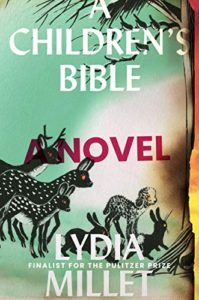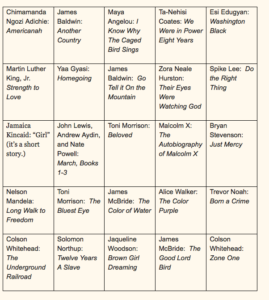 Disaster is Our New Normal
Disaster is Our New Normal
We didn’t deliberately choose apocalyptic literary fiction, but it happened. The timing was weird, frankly. Millet, a finalist for the Pulitzer, just published this newbie in May 2020. This book follows a group of teenagers who are “summering” with their inattentive parents when an apocalyptic storm changes their landscape literally and figuratively. We don’t want to give away too much because this book is spanking new. It is, however, very timely. As for the “Bible” part, the teenage protagonist, Evie, looks after her own little brother, Jack (their parents—like the other parents—are physically present but emotionally absent. Jack is given a children’s Bible, and the story begins to unfold in biblical ways…
Jennifer: I was really drawn into the book description before reading it. I thought it sounded fascinating. I’m still wrestling with my own assessment. What are your thoughts?
Lara: Well, I want to point out that while the book’s title and cover with little animals could lead someone to believe it’s a children’s book, it is not. That said, the parents in this book are pretty worthless (as they are in a lot of YA books going back to the YA OG author Judy Blume) and it’s the kids who are left to save the day after a climate-change induced storm reeks havoc on their summer.
Jennifer: Did that bug you? That worthless-parent thing that’s so popular — in YA, in this, in sit-coms? It did bother me, actually. The stereotypes — the sucky parents, the kids-who-know-better. The kids have this game going in which they don’t admit to whose parent is whose, and it becomes a guessing game. I guess I’m wondering what you thought of these parents? What did you think about any of these characters?
Lara: I felt like there were too many characters, parents and kids, to keep track of. There was no real way to know who was familied with whom. And because they were too hard to identify with, I didn’t really connect with any of them. What were your thoughts?
Jennifer: Yeah, I agree. I didn’t feel vested in anyone’s fate. Though Evie is the protagonist, the narration is kinda first-person plural: “we” decided to do this; “we” slept in the room in the back; “we” played this game. It’s reminiscent of Jeffrey Eugenides’ The Virgin Suicides. Did this point of view/narration work for you?
Lara: I actually did like the narrative perspective. And I liked Evie, and her sweet and innocent brother Jack. The audiobook version that I ear-read was very well done, and that helped save the book a bit for me. The Virgin Suicides is a masterful book, however. I don’t think you can really compare the two.
Jennifer: Well, two things. Masterful, yes. Lydia Millet, though, definitely is up to that Eugenides standard; this book just fell short, I think. Also, I listened on audio too! I didn’t love the narration! I think it made Evie sound too blasé. Which is worth noting for our other audiobook-lovers (we love audiobooks). Narration truly makes a difference — like hugely. It can make or break a book. I almost think I would’ve liked this more had I physically read it, so that I could see her sentence structure. I think it was a well-written book. What do you make of the biblical allusions?
Lara: So, that’s a loaded question; as you know, I miss this kind of stuff all the time. I saw connection with the flood and the animals, but if there were others… let’s just say that you don’t want me on your “Jeopardy” or Quiz Bowl team when it comes to Literary Allusions, Biblical or Otherwise. Can you enlighten us?
Jennifer: Probably not. As a religious kind o’ gal, I was not thrilled with the weird explanation of God and the Trinity, or the outright dismissal of anything smacking of religious orthodoxy, but, hey, I’m used to it … I mean, this is a bigger issue than Lydia Millet’s slight mockery. I don’t need to go into it. I’ll change subjects: I love Millet’s hair. And we once read together in Tucson, where I sold exactly one book.
This is an unprecedented historic time! As we live in this moment, what have you been reading?
Lara: I do have to say that we started reading this book right about the time that George Floyd was horrifically and senselessly murdered. That alone made it harder to read anything. But this book felt pretty privileged to me. Professor- and artist-type parents who can afford to summer (not take a summer vacation, but “summer”) while they ignore their kids and whatever they are getting themselves into. My reading has been super unfocused. I don’t think I have actually finished a book since we last wrote! I will tell you that I have purchased several books related to the Black Lives Matter movement and the need to elevate Black Voices, including:
- I’m Still Here: Black Dignity in a World Made for Whiteness by Austin Channing Brown
- Why Are All the Black Kids Sitting Together in the Cafeteria? And Other Conversations About Race by Beverly Daniel Tatum
- How to Be an Antiracist by Ibram X. Kendi
- White Fragility: Why It’s So Hard for White People to Talk About Race by Robin J. DiAngelo and Michael Eric Dyson
- Me and White Supremacy: Combat Racism, Change the World, and Become a Good Ancestor by Layla F. Saad
While these are all non-fiction, we have been readers and reviewers of books written by People of Color. Reading about people who are different from you is a great way to listen and learn—and it’s something we will keep doing.
What about you?
Jennifer: Well, yes to being distracted. I’m in the middle of The Ballad of Songbirds and Snakes by Suzanne Collins, the prequel to The Hunger Games. Honestly, I really like it. I’m not carving a ton of time out of my life to read right now, however; both of my kids are desperately waiting for me to finish (I got it first!), and I’m taking forever.
As for George Floyd and what-must-be-called systemic racism, I can easily get on my soapbox—and, incidentally, sound like a professor- and artist-type, like those vapid parents in the book (middle class status keeps me humble, though). My husband and I discuss this all the time. As both a professor and a writer (here I go …), I think too many people are, um, “artless.” Not engaged in the Arts (literature in our case). The decline in the liberal arts in education has left us with adults bereft of an understanding of people — all people, even themselves. We don’t know history! We don’t read books! I’m sure that you, as a “normal” person, encounter tons of people who cavalierly say, “Oh, I don’t like reading.” And I’m sure both of us have people in our lives who we honestly love who just don’t read books. As a prof, I encounter about one book lover for every forty to fifty haters.
I’m sorry to say it, but I will. Reading makes us better people. I made this graphic of a bingo for other purposes, but I’d challenge our fans to “Read Against Racism”! Most are American authors, but not all of them are. I seriously think that reading books like these is a major weapon against the fuel of racism: ignorance.

Next Up!
Join us next month when we take on some social satire in a Hunger Games for adults with John Marrs’ The Passengers.
Until then, let’s all be better humans and pick up a book in the process.
_____________________________________________________________________________
Can’t get enough of Snotty Literati? Follow us on Facebook!
Want to read more from Jennifer? Check her out at www.jenniferspiegel.com
Want to see what Lara is up to? Stay right here at www.onelitchick.com

This book never appealed to me. The Noah’s Ark-style cover – no. And there is a book based on a real event called The Children’s Blizzard. It is so fine. And the memory of that book interfered.
Interesting — you read the other one, yes?